
The Crystals are an American vocal group that originated in New York City. Considered one of the defining acts of the girl group era in the first half of the 1960s, their 1961–1964 chart hits – including "There's No Other ", "Uptown", "He's Sure the Boy I Love", "He's a Rebel", "Da Doo Ron Ron" and "Then He Kissed Me"– featured three different female lead singers and were all produced by Phil Spector. The latter three songs were originally ranked number 263, number 114, and number 493, respectively, on Rolling Stone magazine's list of The 500 Greatest Songs of All Time. However, two songs were omitted from the magazine's 2010 update, leaving only "He's a Rebel" at number 267. In the 2021 update, "Da Doo Ron Ron" was added back to the list at number 366.
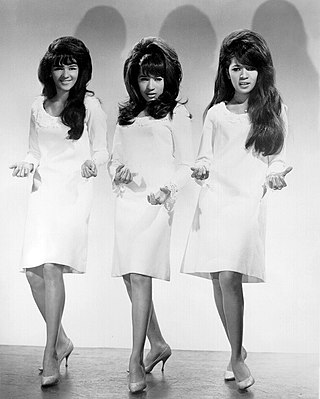
The Ronettes were an American girl group from Washington Heights, Manhattan, New York City. The group consisted of lead singer Veronica Bennett, her older sister Estelle Bennett, and their cousin Nedra Talley. They had sung together since they were teenagers, then known as "The Darling Sisters". Signed first by Colpix Records in 1961, they moved to Phil Spector's Philles Records in March 1963 and changed their name to "The Ronettes".
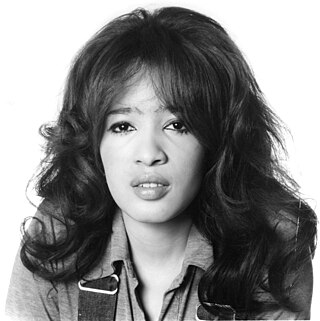
Veronica Yvette Greenfield was an American singer who co-founded and fronted the girl group the Ronettes. She is sometimes referred to as the original "bad girl of rock and roll".

Estelle Bennett was an American singer. She was a member of the girl group the Ronettes, along with her sister Ronnie and cousin Nedra Talley.
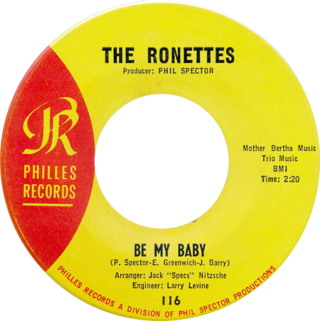
"Be My Baby" is a song by American girl group the Ronettes that was released as a single on Philles Records in August 1963. Written by Jeff Barry, Ellie Greenwich, and Phil Spector, the song was the Ronettes' biggest hit, reaching number 2 in the U.S. and Canada, and number 4 in the UK. It was kept out of number 1 in Canada by Sugar Shack's 6 week run at number 1. It is often ranked as among the best songs of the 1960s, and has been regarded by various publications as one of the greatest songs of all time.
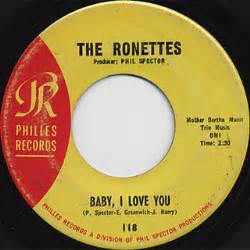
"Baby, I Love You" is a song originally recorded by the Ronettes in 1963 and released on their debut album Presenting the Fabulous Ronettes (1964). The song was written by Jeff Barry, Ellie Greenwich, and Phil Spector, and produced by Spector.
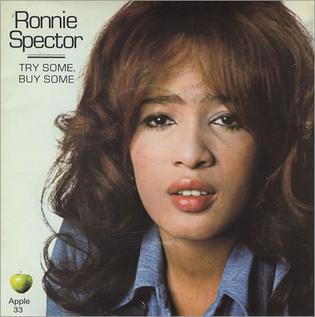
"Try Some, Buy Some" is a song written by English rock musician George Harrison that was first released in April 1971 as a single by American singer Ronnie Spector, formerly the lead vocalist of the Ronettes. She recorded it in London along with other Harrison compositions for a planned comeback album on the Beatles' Apple record label. The project was co-produced by Phil Spector, Ronnie's husband at the time, but abandoned following recording sessions that were hampered by his erratic behaviour. The only official release from the sessions, the single achieved minimal commercial success, peaking at number 77 on the US Billboard Hot 100 and number 63 on Canada's RPM Top 100. Harrison later added his own vocal onto a new mix of the instrumental track and included the song on his 1973 album Living in the Material World.
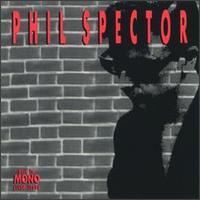
Back to Mono (1958–1969) is a box set that compiles tracks produced by American record producer Phil Spector between 1958 and 1969. It was released in 1991 by ABKCO. Initially a vinyl album-sized package, the box contained a booklet with photographs, complete song lyrics, discographical information, and a reproduction of the essay on Spector by Tom Wolfe, "The First Tycoon of Teen." The package also contained a small, round, red "Back to Mono" pin. In 2003, it was ranked number 64 on Rolling Stone's 500 Greatest Albums of All Time.
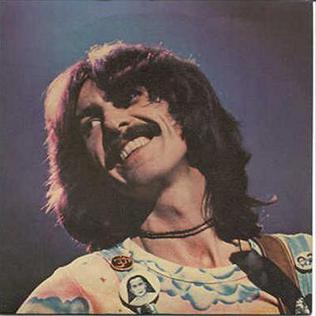
"You" is a song by English musician George Harrison, released as the opening track of his 1975 album Extra Texture . It was also the album's lead single, becoming a top 20 hit in America and reaching number 9 in Canada. A 45-second instrumental portion of the song, titled "A Bit More of You", appears on Extra Texture also, opening side two of the original LP format. Harrison wrote "You" in 1970 as a song for Ronnie Spector, formerly of the Ronettes, and wife of Harrison's All Things Must Pass co-producer Phil Spector. The composition reflects Harrison's admiration for 1960s American soul/R&B, particularly Motown.

"Take Me Home Tonight" is a song by American rock singer Eddie Money. It was released in August 1986 as the lead single from his album Can't Hold Back. The song's chorus interpolates the Ronettes' 1963 hit "Be My Baby", with original vocalist Ronnie Spector providing uncredited vocals and reprising her role. Songwriting credit was given to Mike Leeson, Peter Vale, Ellie Greenwich, Phil Spector and Jeff Barry.
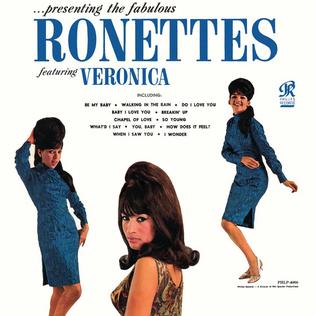
Presenting the Fabulous Ronettes is the only studio album by American girl group the Ronettes. Produced by Phil Spector and released in November 1964 through his label, Philles Records, the album collects the group's singles from 1963–1964. In 2004, it was ranked number 422 on Rolling Stone's list of "The 500 Greatest Albums of All Time".
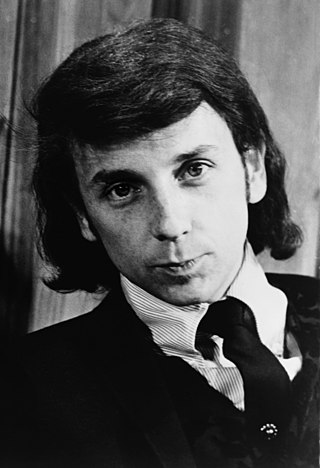
Harvey Phillip Spector was an American record producer, songwriter, and convicted murderer. He is best known for his innovative recording practices and entrepreneurship in the 1960s along with his two trials and conviction for the murder of Lana Clarkson in the 2000s. Spector developed the Wall of Sound, a production style that is characterized for its diffusion of tone colors and dense orchestral sound, which he described as a "Wagnerian" approach to rock and roll. He is widely regarded as one of the most influential figures in pop music history and one of the most successful producers of the 1960s.

"Say Goodbye to Hollywood" is a song written and performed by Billy Joel, first released in 1976 on his album Turnstiles as its opening track. It was originally released in the United States as the B-side to "I've Loved These Days" before being released as A-side in various countries like the UK, Germany and Australia in November 1976, with "Stop in Nevada" as the B-side. However, the song achieved greater recognition in 1981 when a live version from Songs in the Attic was released as a US single, with the live version of "Summer, Highland Falls" as a B-side. Joel wrote the song after moving back to New York City in 1975; he had previously relocated to Los Angeles in 1972 in an attempt to get out of an onerous record deal. The man who represents this song on the Turnstiles album is the man wearing sunglasses and holding a suitcase.

"Is This What I Get for Loving You?" is a pop song written by Phil Spector, Carole King and Gerry Goffin and recorded by 1960s girl group The Ronettes. The song featured Ronettes lead singer Ronnie Spector on lead vocals, and Ronettes Nedra Talley and Estelle Bennett on backing vocals. Released on Philles Records, reaching No. 75 on the Billboard Hot 100 in 1965.
This article is a discography for American singing group The Ronettes. The Ronettes began recording with Colpix Records in 1961 and recorded eleven songs for Colpix. In March 1963, the group moved to Phil Spector's Philles Records, where they achieved their biggest success.

"He's Sure the Boy I Love" is a 1962 single by The Crystals. It was originally recorded by The Blossoms but credited to The Crystals. On the Billboard charts in 1963, "He's Sure the Boy I Love" peaked at No.11 on the Billboard Hot 100 and No.18 on the Hot R&B Singles.

Be My Baby: How I Survived Mascara, Miniskirts, and Madness, Or, My Life as a Fabulous Ronette is a memoir by Ronnie Spector co-written with Vince Waldron, which recounts her roller-coaster career as lead singer of the Ronettes and her emotionally abusive marriage to Phil Spector. A film adaptation starring Zendaya as Ronnie was announced in 2021.

Unfinished Business is the second studio album by American singer Ronnie Spector, released in 1987.

"Do I Love You?" is a song written by Phil Spector, Pete Andreoli and Vini Poncia. It was recorded by American girl group the Ronettes in 1964 and released on their debut album Presenting the Fabulous Ronettes.
The Pussywillows were a group that featured Elinor Blake, Lisa Dembling and Lisa Jenio. Their recordings have appeared on the Kill the Moonlight soundtrack, and the Rutles Highway Revisited album.


















